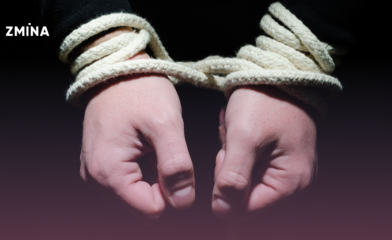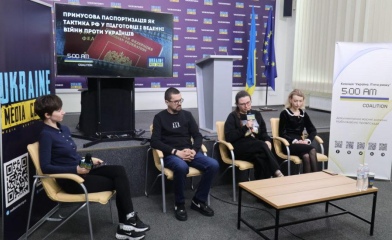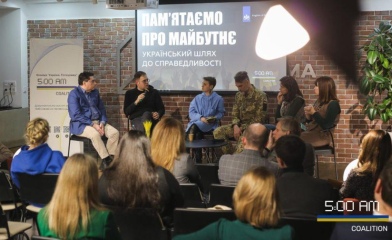Will all those who commit war crimes on the territory of Ukraine be brought to justice, when can this happen, and what is the scale of the crimes committed by the Russian military? This was discussed during the panel "Full-scale invasion" as part of the media marathon "10 Years of Russian Aggression in Ukraine. The Path to Justice", organised by the coalition "Ukraine. Five in the Morning" coalition.
According to official data from Ukrainian law enforcement agencies, over 122,000 criminal proceedings have been opened under the article "violation of the rules and customs of war" in the two years since the start of the full-scale invasion. One of the main factors for future justice is the quality documentation and preservation of evidence of the crimes committed by Russians on the territory of Ukraine.
Tetyana Pechonchyk, Head of the Board of the ZMINA Human Rights Centre, noted that the main work on investigating war crimes and bringing perpetrators to justice lies with the national justice system.
"Justice processes will take years and decades. We have to build our work with this factor in mind and be ready to continue doing it in 10 years. And we have to do it in a quality manner so that the documented data can be used in courts," said Ms Pechonchyk.
Human rights activists note that the figures available as of February 2024 do not reflect the real picture of the crimes committed by the Russian Federation in Ukraine. This is mainly due to the fact that the aggressor country deliberately conceals information, especially regarding civilian hostages.
Yuriy Armash, the head of the medical unit of the 59th Brigade's mechanised tank battalion, who survived Russian captivity, said that both civilians and soldiers are tortured in places of detention in the temporarily occupied territories. Sexual violence by the occupiers is widespread, affecting not only women but also men and, in some cases, children.
"Few people talk about it. And few people want to hear about it at all," says the former prisoner and adds: "Russia prioritises the return of its military, so it is not interested in the return or exchange of civilian prisoners." " When we were captured, the Russians told us that civilians would be exchanged only at the end of the war. When "Russia has achieved its goal". Unfortunately, civilians are not a priority."
"There are exchanges, people are coming back. Someone is lucky and learns something about their loved one, regardless of whether it is a military or civilian, because they are kept together. The exact number of civilian hostages is currently unknown. According to the Office of the Ukrainian Parliament Commissioner for Human Rights, it is about 20,000 people. And if you look at the published register of the Ministry of Internal Affairs, the figure is different," said Kateryna Ogievska, a representative of the NGO Civilians in Captivity, adding: " Even now, people are being detained in the temporarily occupied territories. Generally, for no reason at all: you can walk down the street in the wrong way or look at the Russian military in the wrong way."
 Kateryna Ogievska
Kateryna OgievskaRegarding the deportation of civilians: up to 2.8 million people have been moved from the temporarily occupied territories of Ukraine to the territory of the Russian Federation, hundreds of thousands of them children. According to official figures, the number of deported children reaches 19,500. To date, only 388 of them have been returned.
"When we communicate this problem, this massive crime, which includes an element of genocide, war crimes, and crimes against humanity, we see that Russia cynically violates all international acts, conventions, and laws. This crime is one of the largest since the Second World War," says Vladyslav Havrylov, a research historian at the Where Are Our People project of the PR Army NGO . " By deporting Ukrainian citizens, Russia does not plan to return them, it is hiding information about where it is deporting people. We have already identified 60 'detention centres' for Ukrainian citizens."
Investigating international crimes committed on the territory of Ukraine is primarily a task for Ukraine. At the same time, international bodies are helping in this matter: they take over a certain part of the investigation where Ukraine cannot conduct the investigation itself due to jurisdictional issues, explained Stanislav Petrenko, head of the department for combating crimes committed in the context of armed conflict, Office of the Prosecutor General of Ukraine .
"The International Criminal Court has issued an arrest warrant for Russian President Putin and Lvova-Belova in record time for international justice. This is a great success. Perhaps this does not satisfy the demand that Putin will be brought to The Hague in chains tomorrow - unfortunately, international law does not work that way. But Putin has the stamp of an international criminal, and this stigma cannot be easily removed," said the OGPU representative.
Human rights activists are convinced that it is important that the perpetrators are fairly punished. After all, the lack of a proper response to the crimes committed by Russia against Ukrainians at the beginning of the aggression in 2014 led to their recurrence with the beginning of the full-scale invasion of the newly occupied territories, but on a much larger scale.

"We now realise how important it is that the perpetrators are really punished and brought to justice. This is the only way to show others that it will be the same for them even in 5, 10 or 50 years," added Zera Kozlieva, Senior Legal Advisor at Truth Hounds.
The panelists noted that in order to achieve justice in the future, joint work of Ukrainian law enforcement agencies and society, represented by journalists and civil society organisations that collect information, investigate and conduct monitoring missions, is required.
The recording of the discussion is available in English and Ukrainian.



